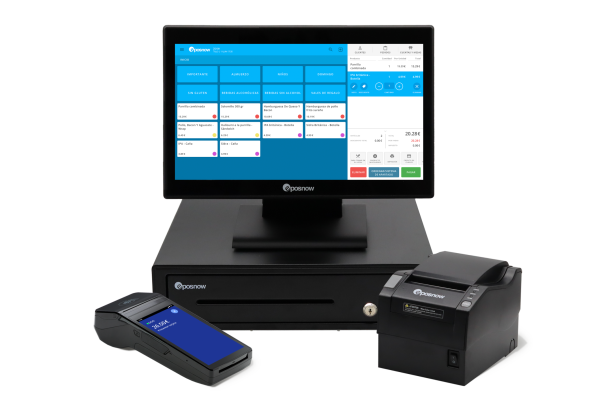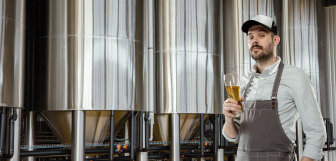How to Open a Brewery - Tips for Starting a Successful Brewery
If you're a fan of the craft beer industry, you may have dreamt of opening your own brewery one day. And let's face it, who wouldn't want to be surrounded by delicious beer all day long?
But as exciting as the prospect of starting your own brewery may seem, it's important to remember that the brewery business is not for the faint of heart. To succeed, you'll need a solid plan in place that covers everything from brewing equipment to marketing strategies. In this blog, we’ll cover the six key steps to opening a brewery:
- Step 1: Research and planning (including writing a business plan)
- Step 2: Brewery equipment and supplies
- Step 3: Recipe development and testing
- Step 4: Marketing and branding
- Step 5: Operations and management
- Step 6: Investing in tech
Put it all together, and you’ll soon have all the necessary, nitty-gritty details of starting a successful brewery. So grab a cold one, sit back, and let's get brewing!
Types of brewery businesses
Before we share our tips on how to start a brewery business, let's take a look at the different types of breweries. This will help you determine which business structure you'd like to follow.
It's important to note that the craft brewing industry is constantly evolving, and each type of brewery has many variations and subcategories.
However, these are some of the most common types of breweries you'll come across.
- Craft breweries: Craft breweries are independent and typically produce small batches of beer using traditional brewing methods. These breweries are known for their focus on quality and experimentation and often have a loyal following of craft beer enthusiasts.
- Nano breweries: These are even smaller than craft breweries and typically produce less than three barrels of beer per batch. These small operations are often run by passionate homebrewers who are looking to turn their hobby into a business.
- Regional breweries: This type of brewery produces beer on a larger scale and distributes its products across a specific region, such as a state or group of states. These breweries often have a flagship beer that they are known for and may also produce seasonal or limited-edition brews.
- Contract brewing companies: Contract brewing companies don't have their own brewing facility but contract with other breweries to produce their beer. This can be a good option for new brewery owners who want to get their products to market quickly without investing in their own brewing equipment.
Step 1: Research and planning
Alrighty then, let's get started with the research and planning phase of starting your own business. This is where the rubber hits the road, so to speak, and where all great brewery owners have started.
Market research:
First up, you need to do some market research to determine if your craft beer dreams have legs to stand on. This means investigating the competition in your area, understanding the demographics of your target market, and identifying any gaps in the market that your brewery could fill.
Writing a brewery business plan:
Next, it's time to put together a comprehensive brewery business plan. This will be your roadmap for success and should cover everything from your target market and pricing strategy to your distribution plan and long-term financial projections. Don't skimp on getting this step right, as a well-written business plan can make all the difference when it comes to securing small business loans or pitching to potential investors.
Choosing a location:
Once you have your business plan in place, it's time to start scouting out locations for your brewery. Look for a space that has enough room for brewing equipment, as well as areas for storing ingredients, packaging, and shipping beer, and welcoming visitors to your tasting room.
Pro tip: make sure you're familiar with local zoning laws and regulations that may impact where you can set up shop.
Legal considerations:
Now it's time to get into the nitty-gritty legal details. You'll need to apply for a brewer's permit and any necessary local licences and permits. It's also important to consider liability insurance, trademarking your brewery name, and the legalities around hiring staff.
Funding options:
Last but not least, you'll need to consider brewery funding options for your brewery. This could include small business loans, angel investors, or crowdfunding campaigns. Don't forget to also consider partnerships with beer distributors or local businesses that could help you get your brewery off the ground.
There you have it, brewery owners - the research and planning phase in a nutshell! Nextwe'll deep dive into the essential brewing equipment and supplies you’ll need. Cheers!
Step 2: Brewery equipment and supplies
Now let's talk about the fun stuff - it's time to source and purchase brewing equipment and supplies! If you want to start a brewery, you're going to need some serious gear to get brewing.
Types of brewery equipment:
First up, you'll need to invest in some brewing equipment that fits your budget and your brewing goals. This could include anything from mash tuns and brew kettles to fermenters and kegging systems. Don't forget to also consider the supporting equipment you'll need, such as pumps, hoses, and temperature control systems.
Sourcing equipment:
Once you've identified the needed equipment, it's time to start sourcing it. There are a variety of suppliers out there, from large manufacturers to small ma-and-pa shops. Do your research and compare equipment costs to find the best deal for your budget.
Setting up the brewery:
Once you have all your equipment in hand, it's time to start setting up your brewery. This can be a daunting task, but with some careful planning, you'll be up and running in no time. Make sure you have a clear understanding of how much space you have, the brewing process, and how your equipment fits into it. Don't be afraid to ask for help from experienced brewers or industry professionals if you're feeling unsure.
Pro tip: When setting up your brewery, make sure you consider space for future expansion. If you can afford it, after considering your budget and business plan, then it’s a great idea if you can get larger premises. After all, you never know when your small-time operation will take off, and demand for your beer will skyrocket!
Step 3: Recipe development and testing
Alright, we've covered the research, planning, and equipment stages of starting a brewery - now it's time to get down to the best bit – brewing beer itself. Let's talk about recipe development and testing!
Craft beer creativity:
One of the joys of brewing beer is the creativity it allows. You have the opportunity to experiment with different ingredients and flavours to create your own unique beers that stand out in the craft beer community.
Research and experimentation:
But with that creativity comes a need for research and experimentation. You'll need to have a solid understanding of brewing techniques, as well as an ability to taste and identify flavours. Start by researching and experimenting with different hops, malts, and yeasts to understand how they interact with one another.
Scaling up recipes:
Once you've developed a recipe that you're happy with, it's time to start testing it on a larger scale. This will involve brewing large batches and tweaking the recipe as necessary until you get the flavour, colour and consistency you're looking for. Remember to take notes and document everything so you can easily repeat the recipe in the future.
How much beer?
When it comes to brewing beer, the question on everyone's mind is always, "How much beer can I make?" The answer to this question will depend on the size of your brewery and the equipment you have available. But as a general rule, you can expect to produce anywhere from 5 to 15 barrels of beer per batch.
Step 4: Marketing and branding
Alright, we've covered the brewing process, but now it's time to talk about marketing and branding your brewery. After all, you could have the best beer in the world, but if nobody knows about it, your business won't succeed.
Crafting your brand:
First, you'll need to develop a strong brand identity that sets your brewery apart. This could include everything from your logo and packaging design to your craft brewery menu and online presence. Consider working with a professional designer or branding agency to help you develop a cohesive and memorable brand identity.
Marketing your brewery:
Once you have your brand in place, it's time to start marketing your brewery. There are a variety of tactics you can use, from social media and email marketing to events and sponsorships. Consider partnering with other local businesses to cross-promote each other's products and services.
Selling your beer:
When it comes to selling your beer, you have a few options. You can sell your beer directly from your brewery, or you can partner with a contract brewing company or liquor stores to distribute your beer more widely. Consider working with beer distributors to get your beer into local bars, restaurants, and stores.
Building a following of loyal customers:
Ultimately, the key to success in the craft brewery industry is building a loyal following of beer enthusiasts who love your beer and are excited to spread the word about it. Make sure to engage with your customers on social media and at events, and always be open to feedback and suggestions for improvement.
Step 5: Operations and management
Alright, we've talked about everything from research to marketing, but now it's time to get down to details of running a brewery. Let's talk operations and management!
Brewery management:
Managing a brewery involves more than just brewing great beer - you'll need to take care of everything from hiring employees to serving beer and food to your customers. Consider hiring an experienced head brewer and assistant brewer to oversee the brewing process and ensure consistency in your beer, so that you can focus on overseeing other areas like sales, operations and finances.
TIP: Interested in opening a beer garden? Learn more about what you need to know in our how to start a beer garden blog today!
Serving food:
Many new breweries are now choosing to serve food in addition to beer, which can be a great way to attract customers and increase revenue. Consider partnering with a local food truck or chef to offer a rotating menu of tasty bites that pair well with your beer.
Hiring employees:
As your brewery grows, you'll likely need to hire additional employees to help with everything from serving customers to cleaning and maintenance. Make sure to hire employees who are passionate about beer and your brand, and consider offering training programs to help them develop their skills.
Serving beer:
Of course, the main focus of your brewery will be serving great beer to your customers. Invest in high-quality serving equipment, reliable and easy-to-use point of sale technology, and train your staff on proper serving techniques to ensure that every beer is served at its best.
Managing finances:
Running a new brewery can be expensive, so it's important to have a solid financial plan in place. Consider working with a financial advisor or small business lender to help you develop a budget and secure funding for your brewery.
Staying compliant:
In addition to managing finances, you'll also need to stay compliant with local and federal regulations, such as obtaining a federal brewer's permit and adhering to health and safety codes. Consider working with a lawyer or consultant to ensure that your brewery is following all necessary regulations.

The Brewery POS that keeps the drinks flowing!
Say cheers to smooth transactions, quick drink service and real-time reporting! Our top-of-the-line brewery point of sale (POS) system helps your craft beer business thrive.
Step 6: Invest in tech
Investing in technology can be a smart move for any brewery looking to streamline operations and improve the customer experience. Here are some areas where technology can make a big impact:
Payment processing services
Make sure to choose a payment processing service that is reliable, secure, and easy to use for both you and your customers. Consider options like Epos Now Payments that offer mobile payment options and can integrate with your point-of-sale (POS) system.
Brewery POS
A brewery POS system lets you manage sales, inventory, and payments in one central location. Look for a system that is easy to use and can handle the unique needs of a brewery, such as tracking beer inventory (with auto alerts for low stock) and managing growler fills.
Online ordering and delivery
In today's world, many customers expect the convenience of being able to order beer online and have it delivered to their door. Consider investing in an online ordering and delivery platform to expand your reach and offer customers a seamless shopping experience. Many POS systems can integrate with your favourite online ordering apps, making it a seamless experience for your customers, and an easy process for you to manage sales from multiple channels.
Data analytics
Tracking sales, inventory, and customer behaviour data can help you make informed decisions about everything from pricing to marketing. Consider investing in a data analytics platform like Tableau or Google Analytics to help you make data-driven decisions.
Top tip: The best hospitality POS solutions will be able to offer you all of the above, with user-friendly technology. At Epos Now, we also grow with your business, meaning you don’t need to worry if your POS can keep up as your brewery business booms.
Brew-sing for Success: Final Thoughts
Starting a brewery is no small feat, but for brewers with a passion for craft beers, it can be a dream come true. While it's important to have a solid business plan, high-quality equipment, and a strong marketing strategy, it's equally important to remember why you got into the brewing business in the first place: your love for craft beer.
In a crowded craft brew market, it's important to stand out with unique flavours, creative branding, and a commitment to quality. And remember, it's not just about serving delicious beer – it's about creating a welcoming atmosphere and building a community around your brewery.
So whether you're starting a nano brewery or a regional operation, keep brewing up new ideas, trying out new recipes, and always keep your customers in mind. With hard work and dedication, you can turn your passion for craft beer into a successful and fulfilling career in the brewing industry.
Cheers to all the aspiring craft brewers out there – may your pints be full and your hops be plentiful.
Speak to our team of experts to find out more about our Brewery POS!




